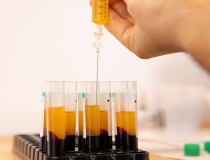Platelets are an element of the blood that contains growth factors, and many doctors believe injecting them into an injured area helps tissues repair themselves faster. As a result, the platelet-rich plasma (PRP) injection treatment was developed, and while it's not a medical cure, it is widely used to minimize pain and reduce recovery time for many conditions.
The process starts with the collection of blood from the patient. Then, the patient’s blood will be placed in a centrifuge to spin at different speeds until it separates into layers. One layer contains platelet-rich plasma, which will then be reinjected into the area of concern.
One of the most common questions for those planning to undergo this treatment is how long the PRP injection recovery time is. If you're wondering the same, then keep on reading.
By the end of the article, you will be equipped with the proper knowledge of PRP methods, allowing you to make informed decisions on the best treatment for you.
What is PRP Injection Used For?
PRP injections are utilized in various procedures but mainly treat muscle, tendon, ligament and joint injuries.
Sustaining musculoskeletal injuries requires a significant amount of recovery time. Most patients need three to six months of rest before returning to regular activities. However, prolonged inactivity is not ideal for athletes who need to get back into their sport as soon as possible. For this reason, they opt for PRP injections to help speed up their recovery.
Another common use of PRP injection is to manage pain brought on by osteoarthritis, which is a common form of arthritis that occurs when the protective cartilage that protects the bones wears down over time.
If you are considering using PRP injections for your knee or hip issues, you must first ask your doctor for their professional opinion, as they will know your history. This is because not every injury can be treated with PRP, and you might need to undergo other tests to rule out any other health problems.
How to Prepare for a PRP Procedure?
Here are a few of the things you can expect when preparing for a PRP procedure:
- You will be required to tell your doctor about any medication you are currently taking since certain drugs can interfere with platelet function, which would lessen the effectiveness of the treatment.
- Doctors will advise you to stop taking certain medicines, such as aspirin or other anti-inflammatories, for a week before the procedure.
- Taking blood-thinning herbs or supplements is also discouraged.
- On the day of the session, it's essential to eat a complete and healthy meal and drink plenty of water.
Doing the above things ensures the procedure's success and helps shorten the PRP injection knee recovery time.
What Happens During a PRP Procedure?
PRP injections are outpatient procedures performed in the doctor's office and typically last under an hour. The doctor will numb the area to ensure you are comfortable during the injection process and will most likely use an ultrasound to guide the needle to where it should be inserted. Typically, PRP treatments are composed of three sessions over three to six weeks.
What Is the Recovery Time for PRP Injection?
PRP hip injection recovery time is relatively quick compared to other hip or knee treatment procedures. You can immediately go home after the session, but it's a good idea to have someone drive you since you may experience stiffness in the affected area. You should expect mild pain and irritation within 24 to 48 hours following the PRP injection.
To shorten the PRP injection knee recovery time, doctors may advise you for the first two days to do the following:
- Avoid any physical activities that put pressure on the injected area.
- Ice the injection site for 20 minutes every two to three hours.
- Don't use nonsteroidal anti-inflammatory drugs while recovering since it may lessen the effect of PRP.
Pain medications are rarely prescribed following a PRP session. This is because patients will only experience minimal pain and the PRP injection recovery time is quick.
Once you complete the series of injections, the general healing period is four to six weeks. Physical therapy may be recommended to you by your doctor when you hit the 5-week mark to aid your long-term healing.
Consult the Experts at Chicago Cell Therapy & Regenerative Medicine
The Chicago Cell Therapy & Regenerative Medicine is a faction of the American Hip Institute that specializes in non-invasive treatments for hip and knee conditions. Throughout the years, we have developed effective and conservative techniques that rehabilitate tissues without surgery.
If you want to know more about our treatment methods, our team will happily answer any of your questions, including queries about the PRP hip injection recovery time. Contact us now to schedule an appointment with our specialists.


 Thanks a lot for getting my hip right. Looking forward to a full recovery and a great season. Thanks again for everything.
Thanks a lot for getting my hip right. Looking forward to a full recovery and a great season. Thanks again for everything.










